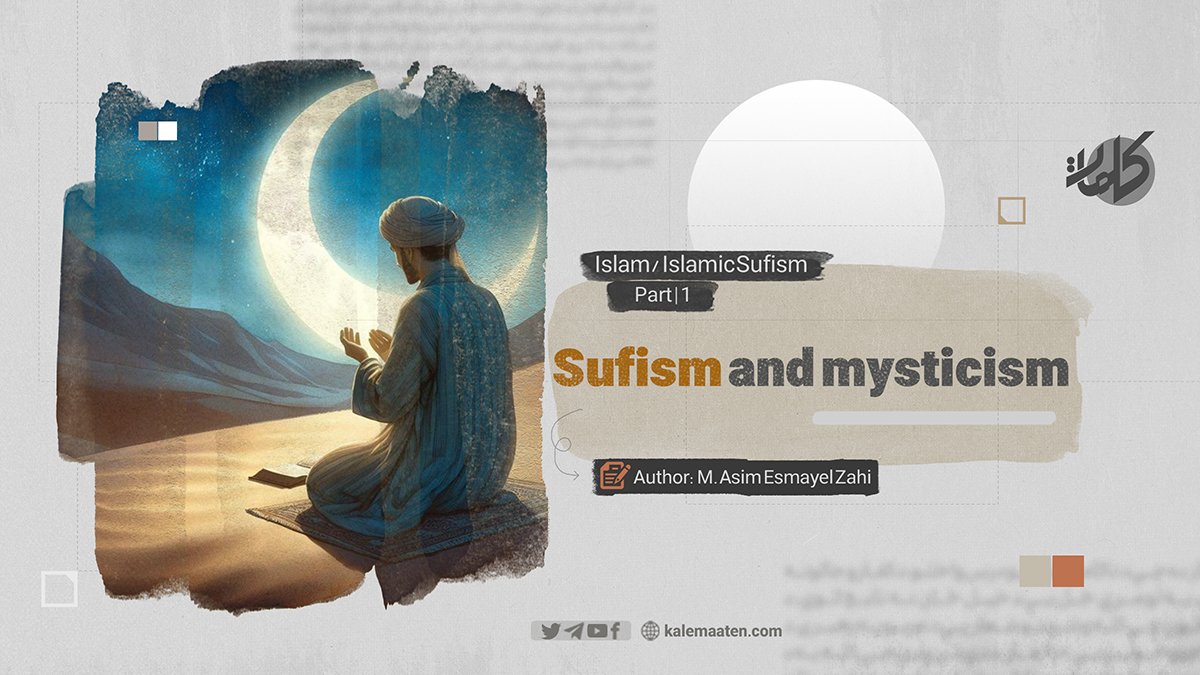
Author: M. Asim Esmayel Zahi
Sufism and Mysticism (Part One)
I am grateful to Allah, who has enlightened the hearts of His saints with the light of His love and directed their souls toward meeting Him with the guidance of joy. Their eyes and minds were immersed in the contemplation of the beauty of His presence until the breeze of the wind of His presence helped them to grow and live. Therefore, their hearts were enraptured and amazed by the sight of the lights of the glory of the Lord of the worlds. They did not pay attention to anything other than Him and did not remember anything except Him.
Endless greetings and salutations to the Ulul Azm prophet, who is the seal of the prophets, the pride of all universes, and the founder of the relationship between creation and the Creator, and to his children and companions, who are the guarantors and bearers of the relationship between man and the Creator of the universe.
Upon pondering and reflecting on His essence, a person realizes the fact that their existence alone is incomplete and they need another to reach the perfection of their existence. It is evident that when a person feels a need in their existence, the motivation to move and desire for perfection will inevitably arise in their heart. As a result, they will become seekers of the means to their perfection. In this case, they will strive to acquire mediators, which the Sufis call “Suluk” and “Tariqa.”
Human perfections can be categorized into two states: they are either scientific or practical. Thus, Suluk (conduct) is the guarantor and encompasses both types of perfection; therefore, the requirement for the perfection of a person’s existence is to embark on the path of Suluk. Other subtleties and points regarding such discussions can be found within.
A great commentator and Hadith Master, a true scholar and Sufi, a special caliph, Hakim al-Ummat Tahanwi, the grand mufti of Mawlana Muhammad Shafi Osmani Deobandi, in the introduction to the treatise “Qasd al-Sabil,” stated that those religious teachings discussed under the title of “Sufism and Mysticism” constitute an important part of Islamic law, without which the religion and faith of a believer cannot be completed. In fact, following all the rules of Sharia is what is interpreted as “Sufism and mysticism.”
However, for a long time, due to the negligence and ignorance of some individuals, as well as the negative propaganda of opportunistic people who have a habit of confusing the topic, this truth has become so vague and complicated that people now view Sufism and mysticism as something distinct from their original principles. For instance, some individuals consider the customs and habits of the elders as “Sufism and mysticism,” others see the acquisition of “states of ecstasy and special inner qualities” as purification and reform, while some mistake self-discovery for “Sufism.” Additionally, others have mistakenly conflated heresies with the concepts of “mysticism and reform” and regarded them as purification and mysticism. In such a situation, the main purpose of Sufism and mysticism has remained obscured, resulting in the blending of non-mystical concepts with mystical ones, which has led to numerous losses and damages.
For example, those who claim to be Sufis without knowing the truth of Sufism and mysticism regard the acquisition of internal and involuntary qualities or the discovery of virtues as purification and reformation. They do not realize that such things are not necessary for purification and reformation, nor are they available to everyone. Similarly, there will not be a defect in the religious perfections of a person, nor will the concepts of Sufism and mysticism suffer. Consequently, followers of tariqat who hold such misconceptions about Sufism and do not achieve these qualities and inner states after effort and austerity may feel disappointed, believing they have not reached the real goal. Conversely, some immoral or deficient individuals, upon obtaining states and qualities through performing a series of prayers and rituals, think they have achieved the ultimate goal of purification and reformation. Therefore, they become proud and believe they have attained the perfection of Sufism and mysticism, when in reality, without fully adhering to the rules of Sharia and the Sunnah of the Messenger of Allah, peace be upon him, no one can reach the ultimate goal of Sufism and mysticism.
This is such a clear truth that all imams and elders of Sufism have specified.
Hakim al-Ummat, the Mujaddid of the 14th century, the great Sufi, Shaykh al-Islam, Allama Mawlana Muhammad Ashraf Ali Tahanawi, said: “Sufism and Tariqa are essentially synonymous with practicing the Sharia. However, for a long time, some ignorant individuals have become confused and have mistakenly imagined that the essence of Sufism consists of the customs and habits of elders and involuntary qualities, along with states of ecstasy and attraction. This ‘self-made definition of Sufism’ has caused some people to feel disappointed due to the lack of proper distinction between mystical concepts and non-mystical ones, leading them to perceive Sufism as a difficult and impossible task. On the other hand, some individuals, upon entering this field, neglect self-improvement and adherence to religious practices, despite committing acts against Sharia and adopting non-Sharia morals and habits. They erroneously believe that obtaining certain inner qualities and having good dreams suffice, while the true essence of Suluk and Tariqa, commonly termed as ‘Sufism and mysticism,’ is that a Muslim should adorn both their ‘outside and inside’ with good deeds and avoid bad ones.
Continues…


